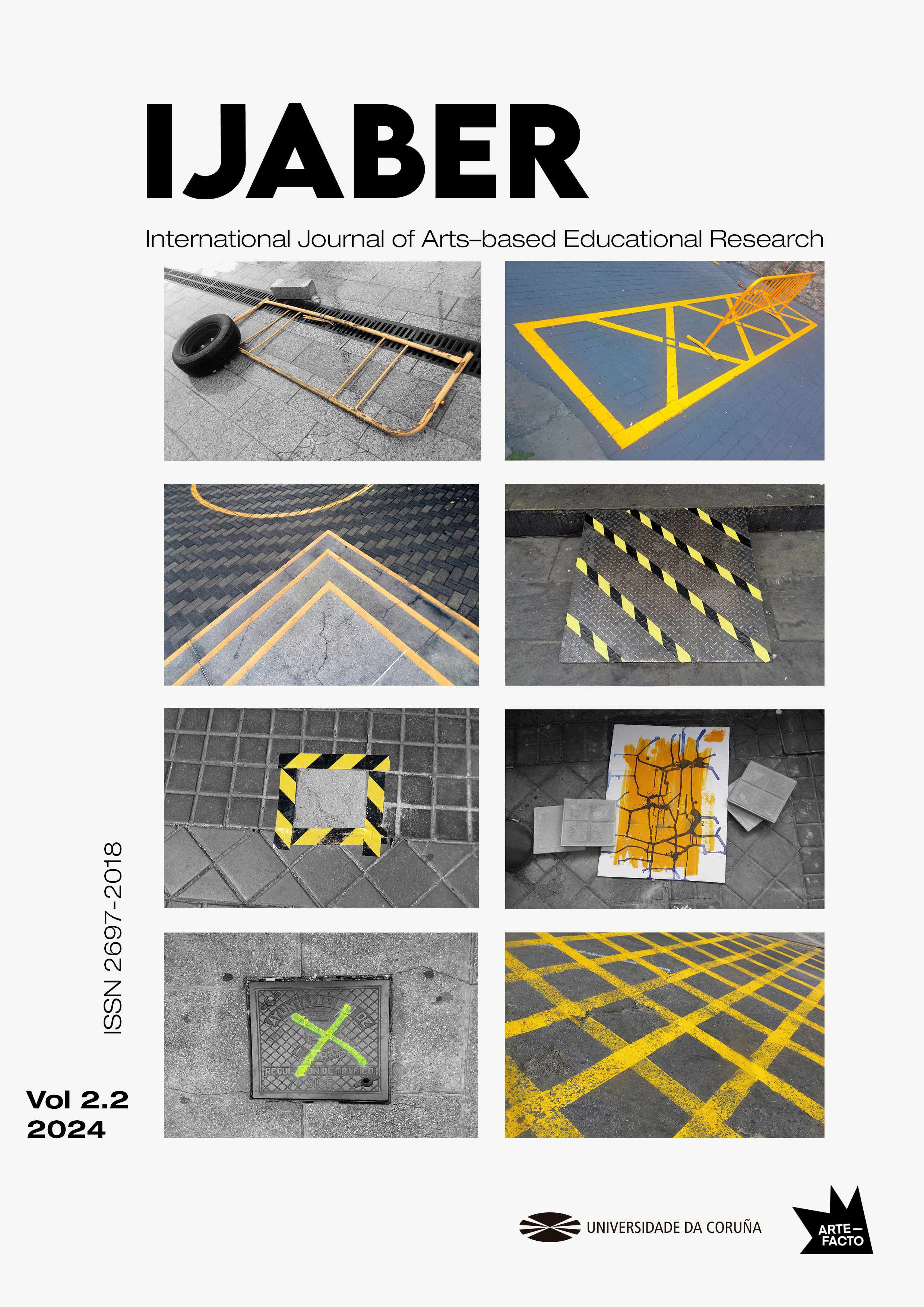Sonic Pedagogies at Border Crossings
Contenido principal del artículo
DOI:
https://doi.org/10.17979/ijaber.2024.2.2.11246Resumen
This article examines soundwalking at the Progreso-Nuevo Progreso International Bridge as an arts-based educational research (ABER) method, specifically through the lens of Sounding Art Practice as Research (SAPAR). By immersing participants in border soundscapes, the study investigates the socio-cultural and political dynamics of the U.S.-Mexico border and their pedagogical implications. Through deep listening, participants explore how sound constructs, disrupts, and reflects borders, offering new sensory-based approaches to art education. The practice emphasizes the role of sound in fostering critical thinking, sensory awareness, and deeper cultural understanding in students. Additionally, it highlights how soundwalking can be used as an ethical and sensitive tool to document the realities of border life without visual exploitation, creating immersive, reflective experiences. The study also incorporates spectrogram analysis, visualizing the harmonic movements between the U.S. and Mexico, further illustrating the complex intersections of sound, identity, and place in borderlands.
Palabras clave:
Detalles del artículo
Referencias
Adajania, N. (2008). In Aladdin’s cave: The politics of sound in contemporary art. In Sound: Documents of contemporary art (pp. 202-206). Whitechapel Gallery.
Anzaldúa, G. (1987). Borderlands/La frontera: The new mestiza. Aunt Lute Books.
Anzaldúa, G. (1999). Borderlands: La frontera: The new mestiza (2nd ed.). Aunt Lute Books.
Altuntas, I. (2022). Sounding art practice as research: Soundwalking the border. Seminar for Research in Art Education (SRAE) Column. National Art Education Association (NAEA) News.
Altuntas, I. (2022). Pedagogy of sounding: Tuning in art education (Doctoral dissertation). University Park: The Pennsylvania State University Libraries. https://etda.libraries.psu.edu/files/final_submissions/25289
Atkinson, R. (2007). Ecology of sound: The sonic order of urban space. Urban Studies, 44(10), 1905–1917.
Gallagher, M. (2015). Sounding ruins: Reflections on the production of an “audio drift.” Cultural Geographies, 22(3), 467–485.
Ingold, T. (2011). The perception of the environment: Essays on livelihood, dwelling and skill. Routledge.
LaBelle, B. (2010). Acoustic territories: Sound culture and everyday life. Continuum.
Massey, D. (2005). For space. SAGE.
Ochoa Gautier, A. M. (2014). Aurality: Listening and knowledge in nineteenth-century Colombia. Duke University Press.
Oliveros, P. (2005). Deep listening: A composer's sound practice. iUniverse.
Powell, K., Altuntas, I., & Bricker, M. (2022). Defamiliarizing a walk. International Review of Qualitative Research, 0(0), 1–17. https://doi.org/10.1177/19408447221090659
Rose, T. (1994). Black noise: Rap music and black culture in contemporary America. Wesleyan University Press.
Schafer, R. M. (1994). The soundscape: Our sonic environment and the tuning of the world. Destiny Books.
Sakakeeny, M. (2006). Resounding silence in the streets of a musical city. Space and Culture, 9(1), 41–44.
Thompson, E. (2004). The soundscape of modernity: Architectural acoustics and the culture of listening in America, 1900-1933. MIT Press.
Waldock, J. (2016). Crossing the boundaries: Sonic composition and the anthropological gaze. The Senses & Society, 11(1), 60–67.
Westerkamp, H. (2007). Soundwalking. In A. Carlyle (Ed.), Autumn leaves: Sound and the environment in artistic practice (pp. 49–54). Double Entendre.



